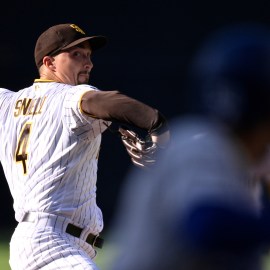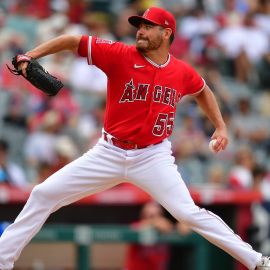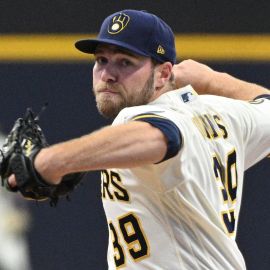A bunch of former Red Sox players are free agents this Major League Baseball offseason. As such, we’ll examine in the coming days whether Boston should bring back any of them while retooling its roster for 2024 and beyond.
Eduardo Rodriguez’s tenure with the Red Sox was complicated.
He oftentimes looked like a potential ace. Like in 2019, when he went 19-6 with a 3.81 ERA across 34 starts (203 1/3 innings) and finished sixth in American League Cy Young voting.
Other times, he stumbled, with workload and control being concerns that prevented his performance from matching his obvious talent.
Story continues below advertisement
But by and large, Rodriguez was solid in Boston. The peaks and valleys led him to a new destination in free agency, as Rodriguez signed a five-year, $77 million contract with the Detroit Tigers before the 2022 season.
Now, Rodriguez is back on the open market after opting out of the three years and $49 million remaining on his deal. He’s essentially banking on a more lucrative payday in free agency, and it’d be surprising if he doesn’t find such based on the leaguewide demand for starting pitching.
So, should the Red Sox consider a reunion with Rodriguez? Let’s break down the case for and against Boston bringing back E-Rod.
The case for signing Rodriguez
The Red Sox might go big game hunting on the starting pitching market, with Yoshinobu Yamamoto, Aaron Nola, Blake Snell and Jordan Montgomery considered the top starters available this winter. Each figures to land a contract in excess of $100 million. Maybe even $200 million in the case of Yamamoto. Rodriguez is a cheaper, second-tier alternative, with MLB Trade Rumors predicting a four-year, $82 million contract and ESPN’s Kiley McDaniel projecting a four-year, $72 million deal.
Story continues below advertisement
That’s still a lot of money — think $18-20 million annually — but the risk is mitigated, to an extent, by the reasonable length of the deal. Whereas the other starters could command six or seven years (or longer), Rodriguez might be attainable by tacking a fourth year onto the three-year commitment he just walked away from and offering a pay bump.
Rodriguez isn’t without flaws, as mentioned, but he’s a good starter who would provide a boost to any rotation. The left-hander went 13-9 with a 3.30 ERA, a 3.66 FIP and a career-best 1.153 WHIP in 26 starts (152 2/3 innings) with Detroit last season. So, it’s not like he’s trending downward. Nor should his next team brace for a sharp decline. He’s turning just 31 next April.
Throw in Rodriguez’s familiarity with Boston, plus the not-so-small fact he was ineligible to receive a qualifying offer this offseason and therefore wouldn’t require the Red Sox to surrender draft-pick compensation to sign him, and it’s easy to see why he’s an attractive free agent option.
More Red Sox
The case for not signing Rodriguez
Well, the Red Sox have been down this road before, right? Sometimes, breakups are necessary. And getting back together only reopens old wounds. While there’s a lot to like about Rodriguez, including his ability to miss bats at a decent-enough clip, history suggests he’ll probably miss time at some point, with injuries being part of his MLB narrative. Rodriguez eclipsed the 160-inning mark only once in eight seasons. (He missed all of 2020 with myocarditis, a heart condition stemming from a battle with COVID-19.)
Story continues below advertisement
There also are a few red flags in the advanced metrics. Rodriguez’s run prevention overall was strong last season, but his hard-contact rates are shifting in the wrong direction, perhaps portending a scenario where he’ll eventually need to tweak his repertoire to sustain success.
Of course, Rodriguez’s deficiencies are baked into the free agency projections. There’s a reason, for instance, he’s pegged for a four-year contract in the $80 million range, whereas a comparable left-hander like Montgomery might land a nine-figure deal on the open market.
With Rodriguez, it’s all about managing expectations. Which actually might explain why he was so polarizing among Red Sox fans during his seven-year run in Boston (2015-21) that included a World Series title in 2018. It always felt like his ceiling was just beyond his reach, when the reality at this point is that he’s an innings-eating, back-end starter with mid-rotation upside — not the No. 1 Boston might prioritize this winter given the state of the rotation.
Featured image via Robert Edwards/USA TODAY Sports Images


















